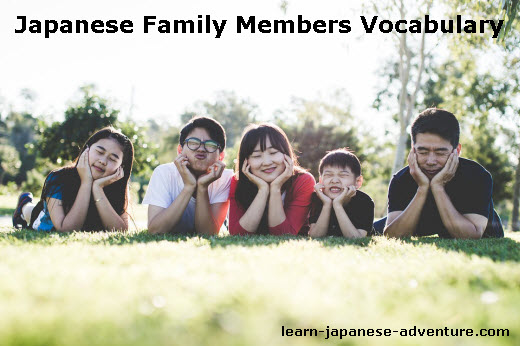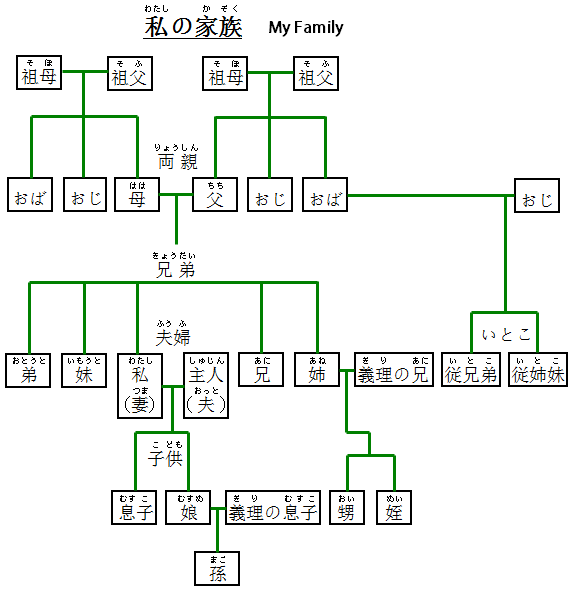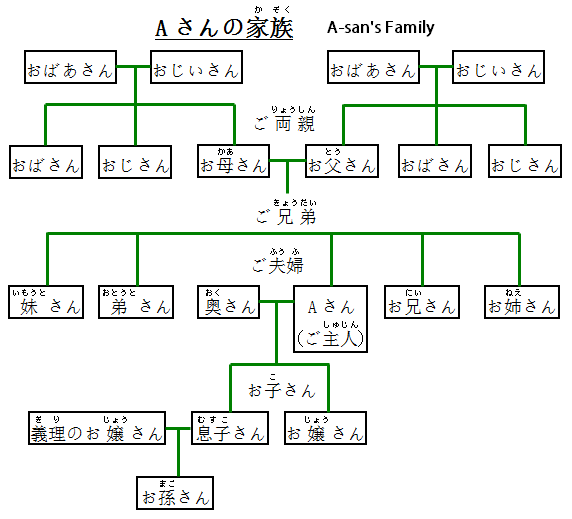- Home
- Japanese Vocabulary
- Japanese Family
Japanese Family Members
Words and Vocabulary
There are two different ways of addressing Japanese family members.
One of them is when talking about your own family members to other people, and the other one is when mentioning someone's family members.

Japanese has this culture that they need to pay respect (尊敬 - そんけい sonkei) to other people when mentioning someone's family members.
While at the same time they have to be modest (謙譲 - けんじょう kenjou) when mentioning their own family members.
Therefore if they have to mention someone's family members in a conversation, they will address them with the words that are more respectful for the Japanese family members.
Whereas if they are talking about their own family members, they address them with the words that will express their modesty.
Let's check out what we have for own family members in the following list.
My Own Japanese Family Members

The following is the word list for one's own Japanese family members.
| Kanji | Hiragana or Katakana |
Romaji | Meaning | |
| 1. | 家族 | かぞく | kazoku | Family / Family Members |
| 2. | 祖父 | そふ | sofu | Grandfather |
| 3. | 祖母 | そぼ | sobo | Grandmother |
| 4. | 伯父 | おじ | oji | Uncle (Older than Parent) |
| 5. | 叔父 | おじ | oji | Uncle (Younger than Parent) |
| 6. | 伯母 | おば | oba | Aunt (Older than Parent) |
| 7. | 叔母 | おば | oba | Aunt (Younger than Parent) |
| 8. | 両親 | りょうしん | ryoushin | Parents |
| 9. | 父 | ちち | chichi | Father |
| 10. | 母 | はは | haha | Mother |
| 11. | 兄弟 | きょうだい | kyoudai | Siblings / Brothers |
| 12. | 姉妹 | しまい | shimai | Sisters |
| 13. | 兄 | あに | ani | Older Brother |
| 14. | 姉 | あね | ane | Older Sister |
| 15. | 弟 | おとうと | otouto | Younger Brother |
| 16. | 妹 | いもうと | imouto | Younger Sister |
| 17. | 夫婦 | ふうふ | fuufu | Married Couple / Husband and Wife |
| 18. | 主人 | しゅじん | shujin | Husband |
| 19. | 夫 | おっと | otto | Husband |
| 20. | 家内 | かない | kanai | Wife |
| 21. | 妻 | つま | tsuma | Wife |
| 22. | 従兄弟 | いとこ | itoko | Cousin (Male) |
| 23. | 従姉妹 | いとこ | itoko | Cousin (Female) |
| 24. | 子供 | こども | kodomo | Children |
| 25. | 息子 | むすこ | musuko | Son |
| 26. | 娘 | むすめ | musume | Daughter |
| 27. | 甥 | おい | oi | Nephew |
| 28. | 姪 | めい | mei | Niece |
| 29. | 孫 | まご | mago | Grandchild |
| 30. | 義理の兄 | ぎりのあに | giri no ani | Brother-in-law (older than you) |
| 31. | 義理の弟 | ぎりのおとうと | giri no otouto | Brother-in-law (younger than you) |
| 32. | 義理の息子 | ぎりのむすこ | giri no musuko | Son-in-law |
| 33. | 義理の~ | ぎりの~ | giri no ~ | ~-in-law |
Someone's Japanese Family Members

The following is the word list for someone's Japanese family members.
| Kanji | Hiragana or Katakana |
Romaji | Meaning | |
| 1. | ご家族 | ごかぞく | go kazoku | Someone's Family / Family Members |
| 2. | お爺さん | おじいさん | ojii san | Grandfather / Old Man |
| 3. | お婆さん | おばあさん | obaa san | Grandmother / Old Woman |
| 4. | 伯父さん | おじさん | oji san | Uncle (Older than Parent) |
| 5. | 叔父さん | おじさん | oji san | Uncle (Younger than Parent) |
| 6. | 伯母さん | おばさん | oba san | Aunt (Older than Parent) |
| 7. | 叔母さん | おばさん | oba san | Aunt (Younger than Parent) |
| 8. | ご両親 | ごりょうしん | go ryoushin | Parents |
| 9. | お父さん | おとうさん | otou san | Father |
| 10. | お母さん | おかあさん | okaa san | Mother |
| 11. | ご兄弟 | ごきょうだい | go kyoudai | Siblings |
| 12. | お兄さん | おにいさん | onii san | Older Brother |
| 13. | お姉さん | おねえさん | onee san | Older Sister |
| 14. | 弟さん | おとうとさん | otouto san | Younger Brother |
| 15. | 妹さん | いもうとさん | imouto san | Younger Sister |
| 16. | ご夫婦 | ごふうふ | go fuufu | Married Couple / Husband and Wife |
| 17. | ご主人 | ごしゅじん | go shujin | Husband |
| 18. | 奥さん | おくさん | okusan | Wife |
| 19. | お子さん | おこさん | oko san | Children |
| 20. | 息子さん | むすこさん | musuko san | Son |
| 21. | お嬢さん | おじょうさん | ojou san | Daughter |
| 22. | お孫さん | おまごさん | omago san | Grandchild |
And if you are interested to find out more vocabulary on Japanese family and how to read them in a correct manner, make sure to check out this page on the must-know terms for family members.
By the way, this link above is an affiliate link, which means that I would earn a commission if you do end up purchasing the related learning course. It's at no extra cost to you, and please if you have any questions related to this learning course, please let me know and I would be happy to answer them for you.
Buy me a coffee









Facebook Comments
Don’t see the comments box? Log in to your Facebook account, give Facebook consent, then return to this page and refresh it.